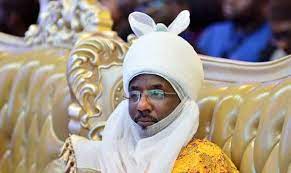By Olu Damilola
The recent move by the Kano State Police Command to summon His Highness Emir Muhammadu Sanusi II for questioning, ostensibly over a Sallah homage visit that included no horses, no title holders, and no formal procession, marks a dangerous low point in the intersection of politics, culture, and governance in Nigeria.
Let us be clear from the outset: this was not a Durbar. It bore none of the hallmarks of the historic Hausa cavalry pageant—no traditional titleholders, no palace horses, no regalia-laden parade through the city. What occurred was a quiet homage—a ride in a car to visit his mother and the state governor, carried out in full compliance with police directives banning Durbar-related horse riding.
Yet the police, in a move that has shocked many observers, have initiated investigations and summoned not just palace aides but the Emir himself. This is not about law or public safety. This is about power, visibility, and intimidation.
The Federal Hand Behind the Summons
Behind this theatrical display of “law enforcement” lies a more calculated political agenda. The police are widely understood to be acting on the orders of powerful figures within the federal government—individuals who have never accepted Emir Sanusi’s return to the throne after his earlier removal for political reasons.
READ ALSO: Just In: Police Summon Emir Sanusi To Force Headquarters Abuja
Sanusi’s reinstatement, made in accordance with tradition and supported by significant public sentiment, has clearly unsettled elements within Nigeria’s ruling class. His voice—intellectual, critical, and unapologetically reformist—represents everything that political gatekeepers fear: a monarch who cannot be bought, silenced, or domesticated.
The Politicization of Security Forces
It is a dangerous sign when state security agencies are used as tools of political retribution. The police have failed to distinguish between a symbolic act of cultural duty and an act of rebellion. Worse still, their intervention appears timed and tailored to undermine Sanusi’s legitimacy, casting a shadow of alleged defiance over what was, in reality, a subdued and respectful observance of Sallah tradition.
This is a misuse of police power, and it calls into question the neutrality of state institutions that are supposed to serve all Nigerians, not the political ambitions of a few.
Undermining Tradition to Secure Power
The true tragedy here is not just the police action—it is the broader erosion of Nigeria’s cultural autonomy and federal balance. The Kano Emirate, like other traditional institutions, carries centuries of historical legitimacy and moral authority. When such institutions become battlegrounds for federal vendettas, the consequences are severe: civic trust erodes, cultural dignity is diminished, and the thin fabric of national unity is strained even further.
READ ALSO: Gov. Yusuf Breaks Silence On Why Emir Of Gaya Was Reinstated
In colonial times, British administrators feared the influence of Emirs and tried to curtail their power through indirect rule and surveillance. It is disheartening to see a postcolonial Nigerian state reenacting that same script—this time with security agents and political handlers instead of colonial residents.
A Legacy Larger than Power
What is it about Sanusi that provokes such disproportionate fear? Perhaps it is his refusal to be silent. Perhaps it is the uncomfortable truth that his legitimacy does not come from state machinery, but from the people, from tradition, and from a moral clarity that has made him a rare figure in Nigeria’s compromised elite class.
Whatever the cause, one thing is clear: this police action has backfired. In seeking to diminish Sanusi, the state has elevated him. In attempting to humiliate him, they have reaffirmed his place as a symbol of dignity under siege.
Conclusion: The State Cannot Police Conscience
In a democracy, cultural expression must not be criminalized. Tradition must not be trampled under the boots of federal anxiety. And most importantly, conscience must never be summoned like a suspect.
The people of Kano know who their Emir is. The world is watching. And history will remember not the orchestrated summons, but the quiet courage of a man who chose duty over fear, dignity over silence.
